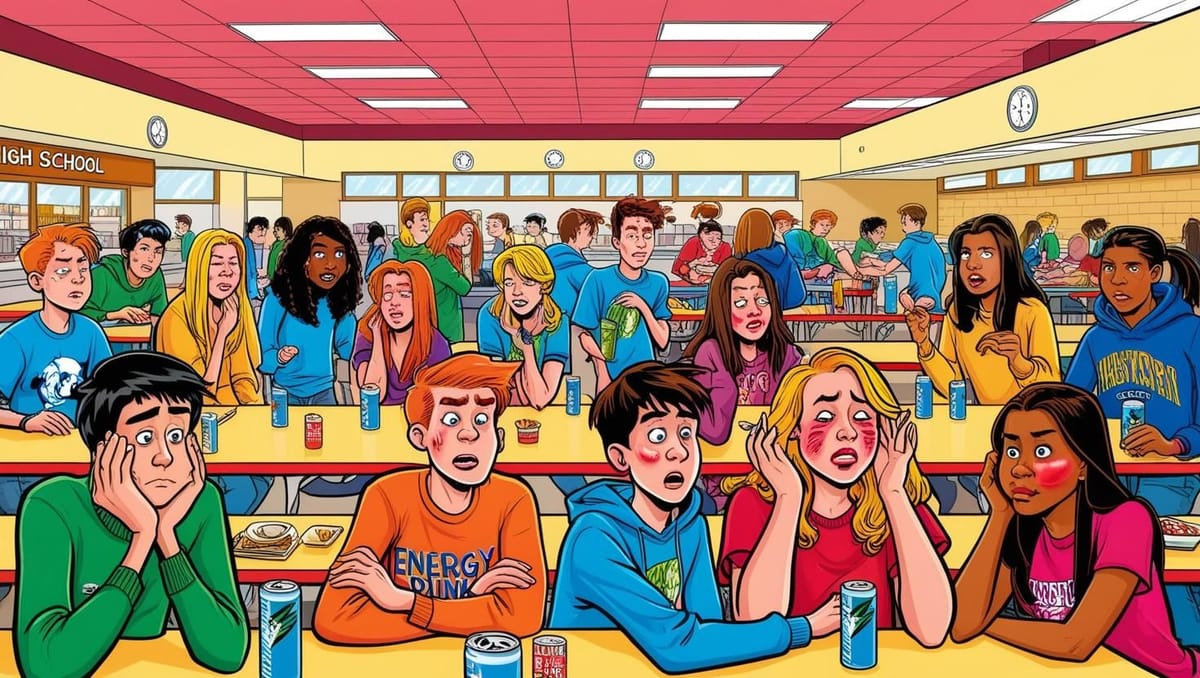The Impact of Caffeine on Students: What Parents and Teachers Should Know
Learn about safety concerns, medication interactions, and practical tips for parents and educators managing student caffeine consumption.

Note: This article is for informational and educational purposes and should not be taken as medical advice. Please consult a medical professional if you need medical advice.
Recent studies have shown a concerning trend in caffeine consumption among elementary and middle school students. With energy drinks and caffeinated beverages becoming increasingly accessible, both parents and educators should understand the implications for young learners' health and academic performance. Emergency room visits related to caffeine consumption among young people have risen significantly in recent years, highlighting the importance of addressing this issue.
Understanding Caffeine: The Basics
Caffeine is a natural stimulant found in coffee beans, tea leaves, and cacao pods. It's also artificially added to many beverages and foods popular among young people. Common sources include:
- Energy drinks (80-150mg per 8 oz)
- Sodas (30-70mg per 12 oz)
- Coffee (95-200mg per 8 oz)
- Tea (14-70mg per 8 oz)
- Chocolate (9mg per oz of dark chocolate)
- Energy shots (200-300mg per 2 oz)
How Caffeine Affects Young Bodies
Children's bodies process caffeine differently from adults. Their smaller size and developing nervous systems make them more sensitive to its effects. A single energy drink can contain as much caffeine as several cups of coffee, which can overwhelm a child's system.
It is important to understand how caffeine interacts with a child's metabolism. Their liver enzymes, responsible for breaking down caffeine, work at a different rate than adults', leading to prolonged exposure to caffeine's effects. This means that even moderate amounts of caffeine can remain active in a child's system for longer, potentially disrupting natural sleep-wake cycles and affecting their daily routines.
Children's developing brain chemistry makes them especially vulnerable to caffeine's influence on neurotransmitters. The stimulant can significantly impact their still-maturing nervous system, potentially affecting everything from mood regulation to cognitive development. This heightened sensitivity means that what might be a mild stimulant effect in adults could manifest as pronounced behavioral changes in children.
These behavioral changes often manifest in ways that can be particularly disruptive in educational settings. Students might exhibit increased impulsivity, difficulty maintaining task attention, or sudden mood swings. The combination of heightened energy levels and decreased impulse control can lead to classroom disruptions, conflicts with peers, and challenges in following structured routines. When caffeine levels begin to drop, children may experience irritability, fatigue, and difficulty concentrating, creating a problematic cycle that can impact their entire school day.
The body mass to caffeine ratio in children means that what appears to be a modest amount of caffeine for adults can effectively be a much larger dose for a child. This disproportion increases the risk of over excitement, anxiety, and other adverse effects, even from products that are marketed as having "moderate" caffeine content.
Immediate Effects
Within 30-60 minutes of consumption, children may experience:
- Increased alertness and energy
- Elevated heart rate and blood pressure
- Jitteriness and tremors
- Difficulty sitting still
- Enhanced mood (temporarily)
Long-term Effects
Regular caffeine consumption can lead to:
- Disrupted sleep patterns: Caffeine blocks adenosine receptors in the brain, interfering with the natural sleep-wake cycle. This disruption affects the brain's ability to consolidate memories and process learning during sleep.
- Anxiety and panic attacks: Children's developing nervous systems are especially sensitive to caffeine's effects on neurotransmitters, which can lead to increased anxiety. Their smaller size and different metabolism rates amplify these effects.
- Dependency and withdrawal: The body adapts to regular caffeine consumption, and children's different enzyme processing rates can lead to prolonged exposure, making dependency more likely.
- Nutritional deficiencies: When caffeinated beverages replace regular meals or healthy drinks, essential nutrients can be missing. Energy drinks' high caffeine content (80-150mg per 8 oz) is particularly concerning.
- Dental problems: Many caffeinated beverages are highly acidic, which can erode tooth enamel over time.
- Chronic headaches: Regular caffeine use can lead to dependency, and when levels drop, withdrawal symptoms, including headaches, can occur.
Impact on Learning and Academic Performance
While students might turn to caffeine to improve their focus or academic performance, research reveals complex effects on learning:
Positive Effects
- Short-term increased alertness
- Improved reaction time
- Enhanced short-term memory
Negative Effects
- Mid-day energy crashes affect concentration
- Increased difficulty with long-term information retention
- Poor quality sleep impacts next-day performance
- Anxiety interfering with test performance
- Reduced ability to focus during caffeine withdrawal
Potential Medication Interactions
The warning about caffeine and medications is important because there are several specific interactions to be concerned about:
For ADHD medications:
- When combined with stimulants like Adderall, caffeine can enhance their effects
- There's an increased risk of anxiety and panic attacks
- It can potentially cause dangerous heart rhythm problems
- Sleep and appetite disruption may become more severe
For anxiety medications:
- Caffeine can reduce how well anti-anxiety medications work
- It may cancel out the calming effects
- There's a higher risk of breakthrough anxiety
- Medication doses might need to be adjusted
For antidepressants:
- Some combinations can increase the risk of serotonin syndrome
- The nervous system stimulation effects are enhanced
- Side effects may become more pronounced
- It can affect how well the medication is absorbed
How Parents Can Help
To help your child maintain healthy habits:
Daily Management
- Monitor all sources of caffeine intake
- Read product labels carefully - caffeine appears in unexpected items
- Set clear rules about energy drink and coffee consumption
- Track the timing of caffeine consumption relative to bedtime
- Maintain open communication about energy levels and sleep
Healthy Alternatives
Instead of reaching for caffeinated beverages, encourage:
- Regular physical activity
- Consistent sleep schedule
- Balanced nutrition
- Proper hydration
- Regular breaks during study sessions
How Teachers Can Help
Teachers and school staff can take proactive steps:
Classroom Strategies
- Recognize signs of caffeine overconsumption:
- Excessive talking or movement
- Inability to focus
- Anxiety or nervousness
- Complaints of headaches
- Afternoon crashes
- Implement supportive practices:
- Regular movement breaks
- Hydration stations in classrooms
- Education about healthy energy management
- Open communication with parents
Creating a Supportive Environment
Success in managing student caffeine consumption requires a collaborative approach:
- Regular communication between parents and teachers
- School-wide policies on caffeinated beverages
- Education programs about healthy energy management
- Support systems for students trying to reduce caffeine intake
- Regular health check-ins with school nurses or counselors
Looking to the Future
As energy drinks and caffeinated products continue to target young consumers, staying informed and proactive is necessary. Parents, educators, and healthcare providers must work together to protect students' health while supporting academic success. Every child is different, and approaches should be tailored to individual needs and circumstances.
Regular monitoring and open dialogue about caffeine consumption can help identify potential issues early and ensure appropriate interventions. By staying vigilant and informed, we can help our students maintain healthy habits, supporting their academic success and overall well-being.
The bottom line is that caffeine and school don’t mix.
Dig Deeper - Sources/Resources
"Adolescent Caffeine Use and Problematic School Behavior: A Longitudinal Analysis of Student Survey Data and Teacher Observations." Journal of Adolescence, Wiley Online Library, 2024, onlinelibrary.wiley.com/journal/10959254.
"Caffeine and Kids." Columbia University Irving Medical Center, Columbia University, www.cuimc.columbia.edu/news/caffeine-and-kids.
"Caffeine's Impact on Students Cited In Push to Curb School Drink Sales." Education Week, www.edweek.org.
"Can Kids Drink Coffee and Caffeine?" Cleveland Clinic, health.clevelandclinic.org.
"How Does Caffeine Affect ADHD." ADDitude Magazine, www.additudemag.com.
"Review: Trends, Safety, and Recommendations for Caffeine Use in Children and Adolescents." ScienceDirect, www.sciencedirect.com.
"Should Teens Taking ADHD, Anxiety and Depression Drugs Consume Energy Drinks and Coffee?" Medical News Today, www.medicalnewstoday.com.
"What Parents Should Know About Kids and Caffeine Amid Rise in ER Visits." ABC News, abcnews.go.com.
❤ Enjoy this Article?
🍵 Show Your Support and 🤗 Share It



